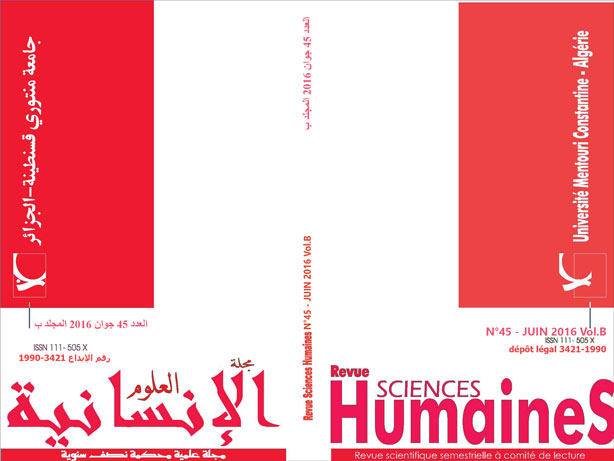Developing Vocabulary Acquisition through Effective Listening and Appropriate Note Taking
Keywords:
Vocabulary Acquisition, Effective Listening, Appropriate Note TakingAbstract
Vocabulary is a basic element in any language, for that students use some tools to help them in learning vocabulary, like checking in dictionaries, asking teachers or peers and learning from word lists. In the current article, we shed some light on students’ attitudes and performances on some types of texts. In our study, we noticed that from the exposure to some texts read to students, they listen and take notes at the same time. After listening and taking notes, students write new essays based on the notes taken. From this practice, students also get used to the combination between modules and to benefit from the information they get in classes. In this case, it is the combination between the Oral Expression and the Written Expression module. At the end of the experiment, we noticed that teacher’s verbal language and body language helped students to develop their listening comprehension, way of taking notes, their system of abbreviations and symbols and theycould benefit from taking notes to learn new words.
Downloads
References
Atkins, B.T. and Rundell, M. (2008). The Oxford Guide to Practical Lexicography. New York: Oxford University Press.
Baker, C. (1988). Key Issues in Bilingualism and Bilingual Education. Clevedon: Multilingual Matters Ltd.
Clarke, C. A. and Fox, S. P. (2007). Grant Proposal Makeover. Transform your Request From No to Yes. CA: Jossey-Bass, John Wiley & Sons, Inc.
Criado, R. and Sanchez, A. (In Press). Vocabulary in EFL Textbooks. A Contrastive Analysis against Three Corpus-Based Word Ranges. University of Murcia.
Crystal, D. (1995). The Cambridge Encyclopedia of the English Language. Cambridge: Cambridge University Press.
Elley, W. B. (1989) Vocabulary Acquisition from Listening to Stories Read Aloud. Reading research Quarterly, 24 (2), 174-187.
Ellis, R. (2008). The Study of Second Language Acquisition. O.U.P.
Field, J. (2008). Listening in the Language Classroom. Cambridge: Cambridge University Press.
Flowerdew, J. and Miller, L. (2005). Second Language Listening. Theory and Practice. New York: C.U.P.
Goh, C. (2005). Second Language Listening Expertise. Expertise in Second Language Teaching. New York: Palgrave McMillan.
Grauberg, W. (1997). The Elements of Foreign Language Teaching. Modern Languages in Practice. WBC Book Manufacturers Ltd.
Gu, P. Y. (2003). Vocabulary Learning in Second Language: Person, Task, Context and Strategies. TESL- EJ. Vol. 7 No. 2. September 2003.
Hirai, D. L. C., Borrego, I., Garza, E. and Klook, C. (2010). Academic Language/ Literacy Strategies for Adolescents. A “How To” Manual for Educators. New York: Routledge, Francis and Taylor.
Hinkel, E. (2005) (ed.). Handbook of Research in Second Language Teaching and Learning. New Jersey: Lawrence Erlbaum Associates, Publishers.
Johnson, K. (2005) (Ed.). Expertise in Second Language Learning and Teaching. New York: Palgrave McMillan.
Jones, G. and Mort, P. (1994) Study Skills for Academic Writing. www. Lc. Unsw.edu. av.
McCarthy, M. (1990). Vocabulary. Oxford: Oxford University Press
Meara, P. (2009). The Vocabulary Knowledge Framework. Logostics, Tools for Vocabulary Research. Swansea University.
Nation, I.S.P. (2005). Vocabulary and Learning Vocabulary. Handbook of Research in Second Language Teaching and Learning. Eli Hinkel (Ed.). New Jersey: Lawrence Erlbaum Associates, Publishers.
Nunan, D. (2005), Classroom Research. Handbook of research in second language teaching and learning. Eli Hinkel (Ed.). New Jersey: Lawrence Erlbaum Associates, Publishers.
Pachler, N. (1999). Teaching Modern Foreign Languages at Advanced Levels. London: Routledge, Taylor and Francis Group.
Ruschhaupt, P. (2010). Using the Cornell Note Taking System. Academic Center. Tutoring and Testing at UHV. // www.scribd.com/doc/186023073/cornell-notetaking#scribd/
Richards, J.C. and Schmidt, R. (2002). Longman Dictionary of Language Teaching and Applied Linguistics. Pearson Education Limited.
Rost, M. (2006). Areas of Research that Influence L2 Listening Instruction. Current Trends in the Development and Teaching of the Four Language Skills.
Usé-Juan, E. and Martinez-Flor, A. (Ed.). Current Trends in the Development and Teaching of the Four Language Skills. Berlin: Walter de Gruyter GmbH & Co. KG, D-10785.
Schmitt, N. (2000). Vocabulary in Language Teaching. Cambridge: Cambridge University Press. Richards, J. C. (Ed.)
Takač, V. P. (2008). Vocabulary Learning Strategies and Foreign Language Acquisition. Clevedon: Multilingual Matters Ltd, Cromwell Press Ltd.
Taylor, G. (2009). A Student’s Writing Guide. How to Plan and Write Successful Essays. Cambridge: Cambridge University Press.
Underwood, M. (1989). Teaching Listening. London: Longman.
Vienna, A. R. (2003). Implicit and Explicit Learning in Incidental Vocabulary Acquisition.www.univie.ac.at/Anglistik/views/03.../RIE_SGLE.PD
Wilkins, D.A. (1972). Linguistics and Language Teaching. London: Edward Arnold.
















